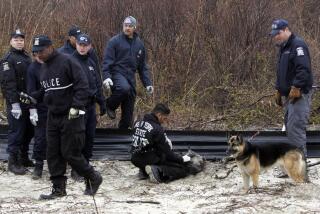Murder Investigation Tests Cyberspace Privacy Rights
- Share via
EAST WINDSOR, N.J. — They met and got to know each other through an online chat room, an electronic gathering place for gay men. In time, they agreed to move from computer screens to a face-to-face encounter.
But their offline meeting Jan. 4 turned deadly, police say, when George Hemenway shot Jesse Unger in the head as a 15-year-old boy looked on.
The last homicide in this Trenton suburb of 22,000--a mix of leafy neighborhoods, new housing developments, farm fields and strip malls--was 10 years ago and stemmed from a homosexual “street encounter,” police said.
This time, the investigation led to the back streets of the Internet. America Online complied with a search warrant and gave authorities computer files and copies of electronic mail between the two men.
That set off lively, occasionally profane debate on the Internet about privacy rights. But experts say online correspondents should not expect privacy and predict that electronic communications eventually will be routinely examined by everyone from government officials to attorneys and direct marketers.
“As we become more computerized . . . I’m afraid it’s inevitable that, absent a high degree of legal intervention, more and more information will be available, not only to law enforcement but also private people,” said noted 1st Amendment attorney Floyd Abrams of New York. “For people who haven’t done anything, it’s a serious danger for their privacy.”
“Most people . . . don’t realize that when they delete e-mail, it doesn’t necessarily go away,” added David Banisar, spokesman for the Electronic Privacy Information Center in Washington.
Computer users should not expect to hide “what you buy, what you read, where you’ve been, who you’ve talked to,” or even sexual orientation and fetishes, from those who seek that information.
“I think you’re going to start seeing the use of online records in divorce proceedings,” Banisar said.
The day after he spoke to a reporter, news broke of a New Jersey woman being sued for divorce by a husband who’d read her e-mail and accused her of an adulterous online relationship, although the couple had yet to meet.
Authorities already use computers to track child pornography, credit-card fraud and embezzlement over the Internet, but this is the first time that police obtained an online service’s computer files for a murder investigation.
Local authorities called in a computer expert to examine both the AOL files and those in five “state-of-the-art” personal computers--three seized from the murder site, the house Hemenway shared with his father; and one each from the nearby homes of the 15-year-old and Unger.
The youth alleges that “both the victim and the accused had molested him on prior occasions,” said police Lt. John T. Funda. “We’re investigating that as a motive.”
The youth had communicated regularly with Hemenway and Unger in an AOL chat room called “NJM4M,” or “New Jersey men for men,” where up to two dozen people type comments back and forth as if on a written conference call.
Unger, 39, was a computer systems analyst in nearby Princeton. Hemenway, also 39, told police that he was a car mechanic and carpenter.
When Hemenway could not drag Unger’s 250-pound body out of his basement, police say he got help from two online friends: Timothy R. Brown, 23, of neighboring Hightstown and Michelle R. Benson, 24, of Trenton.
They wrapped the body in a tarp and spent several hours trying to remove it but gave up, Funda said. Benson later called police.
Hemenway remains in jail, charged with murder and weapons offenses. Police say he has confessed. The public defender representing him would not discuss how he will plead.
Trooper Michael Geraghty of the New Jersey State Police Technical Assistance Unit is going through every file on the seized computers along with hundreds of computer disks, data tapes and cartridges.
Geraghty has yet to tackle the AOL files and may not find much when he does. Because those weren’t sought until two weeks after the killing and AOL computers automatically delete e-mail five days after it is read, Geraghty said the files probably will contain only unread e-mail, which is retained for 25 days.
The case is being watched by organizations that monitor computer privacy and free speech.
“Many America Online users may have a sense they’re being misled and that their privacy is being invaded” because their files could be turned over to others, said Mike Godwin, staff counsel of the Electronic Frontier Foundation in San Francisco.
AOL spokeswoman Pam McGraw said the Vienna, Va.-based service does not archive chat-room conversations, but retains read electronic mail for five days because members want to be able to reread it.
More to Read
Sign up for Essential California
The most important California stories and recommendations in your inbox every morning.
You may occasionally receive promotional content from the Los Angeles Times.













